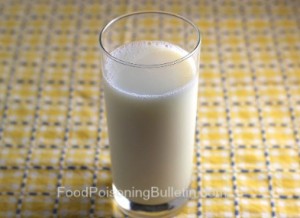A final report about the raw milk Campylobacter outbreak in Durand, Wisc. has been issued by the Wisconsin Department of Health Services (DHS). The 25-page report confirms that the September outbreak, which sickened 38 people and hospitalized 10 who attended a football team potluck dinner, was caused by contaminated raw milk.
The report does not name the farm that provided the milk, referring to it throughout as Farm A, but the name of the farm was released by the state agriculture department in response to an open records request by the Milwaukee Journal Sentinel.
 The owners of the Arkansaw, Wisc. farm, Roland and Diana Reed, did not tell attendees at the football potluck that the milk they contributed was unpasteurized. The Reeds sell their milk to a local cheese maker and are not in the business of selling raw milk. But they drink it themselves and have recently stated that they have been bringing it potlucks for several years. Again, without letting people know it is unpasteurized.
The owners of the Arkansaw, Wisc. farm, Roland and Diana Reed, did not tell attendees at the football potluck that the milk they contributed was unpasteurized. The Reeds sell their milk to a local cheese maker and are not in the business of selling raw milk. But they drink it themselves and have recently stated that they have been bringing it potlucks for several years. Again, without letting people know it is unpasteurized.
Pasteurized, store-bought chocolate milk in half-gallon containers was also served at the banquet. When the chocolate milk ran out, the half-gallon containers were used to mix the raw milk from a five-gallon cooler with chocolate flavoring.
DHS interviewed 65 people who attended the potluck. Twenty six of them had confirmed cases of Campylobacter infections, 12 had probable cases. Of those sickened, who ranged in age from 14-49, 33 were high school students, five were coaches. The median age of the patients was 16.
They were sick for an average of four days with symptoms including diarrhea, headache, fever, chills and sweats, abdominal cramps, nausea, vomiting, body aches and fatigue. Fevers ranged for 99.9˚F to 105˚F with a median of 102˚F.
Among the 38 people who reported consuming milk, 32 consumed the unpasteurized milk and six said the got milk from the half gallon jugs which could have contained either raw or pasteurized milk. Everyone who attended also ate the chicken, which Diane Reed has suggested was the source of illness. However, lab tests showed manure samples taken from the Reed farm were a match to the bacterial samples taken from case patients.




